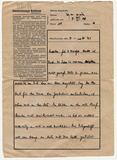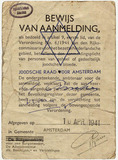Grete Weil’s armband from the Jewish Council for Amsterdam (1942/43)
Grete Weil’s armband from the Jewish Council for Amsterdam (1942/43)
In early summer 1942, Grete Weil received a call to “report to work” – the announcement of her imminent deportation. In order to not have to go underground and to be able to continue to support her mother, she accepted a position in the Jewish Council in Amsterdam. In this special position she was protected against imprisonment owing to “exception certificates”. At the same time, Grete Weil, who was also active in a resistance group, found out early about impending raids via the Jewish Council.
From October 1942, on the orders of the SS and under the leadership of the Jewish Council, the Amsterdam Theatre “Hollandsche Schouwburg” was converted into a collection point for the removal of the Jewish population. Grete Weil used her position to help people and to save them. Yet she confessed decades later “Today I feel guilt that I participated in the Jewish Council. No one knows what would have happened if it had not existed. Whether or not the horror would have been much worse. […] it is not a guilt that has made my life darker. I can only say that I’d feel better if I hadn’t taken part.” (cited by Exner, Lisber: Land meiner Mörder, Land meiner Sprache (“Land of my Murderers, Land of my Language”)).
From September 1943, the employers of Schouwburg were also deported after a large-scale raid. Grete Weil and her mother managed to go underground at the last moment. Grete Weil wrote about her experiences of her work for the Jewish Council and in the Schouwburg in her story Am Ende der Welt (At the End of the World) and in the novel Meine Schwester Antigone (My Sister Antigone).






